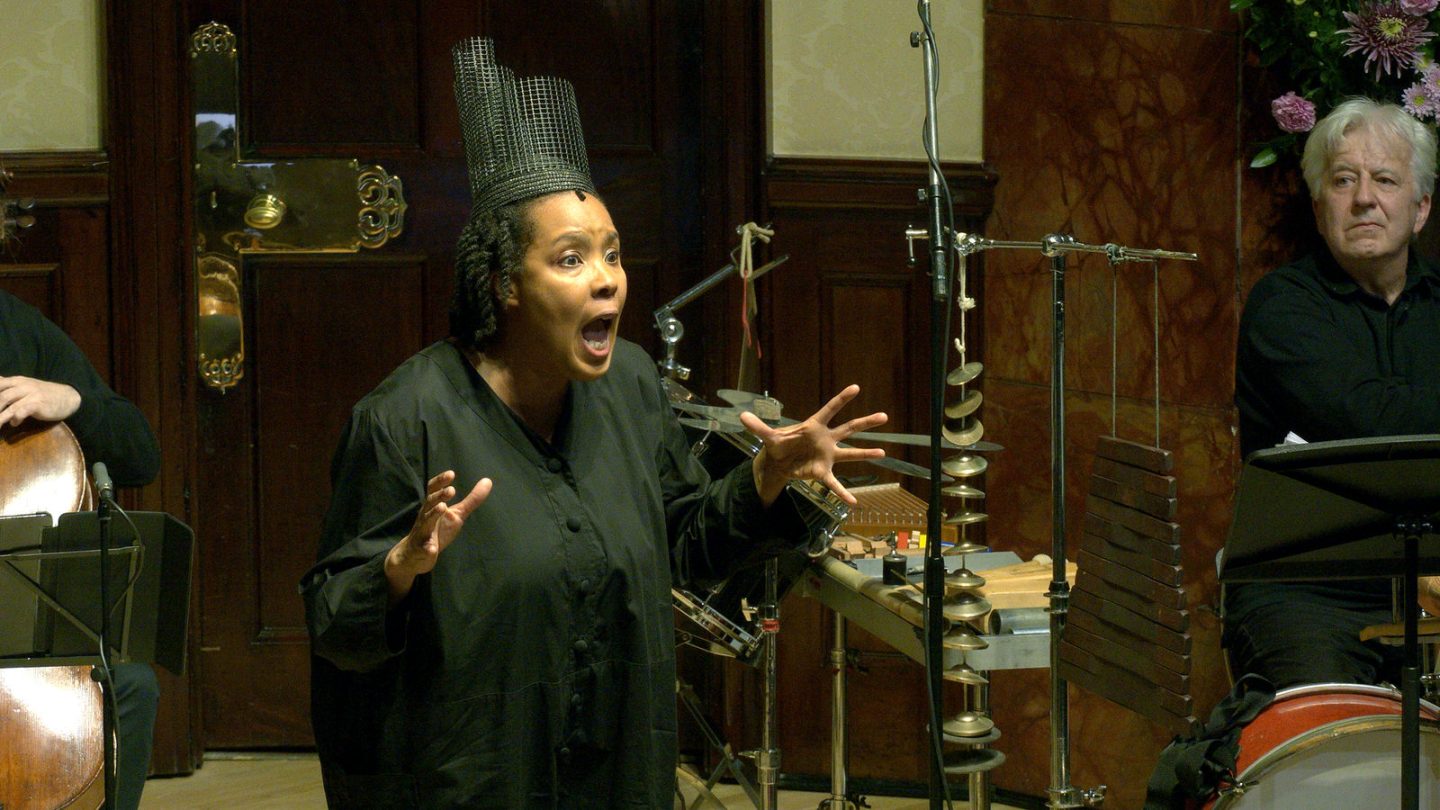VAN Magazine – 1 June 2023
A Chained Man’s Bruise
Benjamin Poore
“With one degree of separation, ‘Eight Songs’ records the sound of the injured and dying from a war between colonial powers. Mitchener’s version shows another vector of that violence: the foundational barbarity wreaked by empire on a different set of bodies.”

“You get this idea of someone knowing that something is not right,” experimental vocalist Elaine Mitchener says of Peter Maxwell Davies’s “Eight Songs for a Mad King.” “It’s askew. You know the headache you have when you have a migraine—you can’t actually see something in front of the eye? That’s how I feel with this: that there’s something obscuring [your vision]…you’re looking for a clearing.”
Davies’s monodrama for voice—most often baritone—and six instrumentalists uses the same instrumentation as Schoenberg’s “Pierrot Lunaire” (plus percussion), and was first performed in 1969 by South African actor Roy Hart and the Fires of London. In it, King George III—or someone who identifies as him—goes to pieces, trying to teach caged birds (here, the instrumentalists) how to sing. (One of the prompts for librettist Randolph Stow’s text was a mechanical organ belonging to George III, played with a similar aim in mind.) At the end, the protagonist smashes a violin and is escorted offstage by a percussionist wielding a bass drum, howling into the distance.
The extraordinary vocal writing of “Eight Songs” is about the struggle to speak and be heard. Performers must go to their vocal limits, and audiences must be braced for some of the most violent and disconcerting sounds they will hear a human body create in a concert hall. The reciter rasps and croaks to create overtones and multiphonics. The score asks them to “ululate, like a dog.” They sing “Comfort Ye, My People” from Handel’s “Messiah” “like a horse.” They scream and yowl—and yet, at times, they sing very tenderly too. The extremities of the piece mean that it can cause both laughter and distress. Responses to the protagonist—revulsion and ridicule as well as empathy and recognition—tell us very much about how societies encounter very public mental health crises, reactions to which can be deadly. In this piece, vocal range implies a special variety.
Similarly dizzying is the score’s stylistic range: There are saloon foxtrots, a ghostly Mozartean rondino, a slushy, cocktail-jazz version of the aforementioned Handel, and a polyrhythmic minuet that drifts in and out of sync. But no pastiche is able to sustain itself, instead collapsing inwards under the unbearable burden of musical continuity. Musical disorder and psychic distress go hand in hand. In one sense the score reflects the fantastical and terrifying visions of the protagonist; in another, the musicians seem to induce further disturbances in the King as his tormentors.
One of Davies’s quotations from “Messiah” is marked “female vocalist.” Enter Elaine Mitchener. Her performance of the piece (with Apartment House at Wigmore Hall on May 16) was the first ever by a female vocalist in the UK. She is not the first woman ever to perform “Eight Songs”—Iranian vocalist Haleh Abghari performed the piece in New York in 2007, and for Davies himself in 2012. But Mitchener’s reputation as one of the most adventurous vocalists working in contemporary music today, as well as the explicitly political character of her artistic practice, marked this out as an important performance.

The stage at Wigmore Hall is dominated by an art-and-crafts cupola, depicting an allegory of musical beauty. My partner pointed out that it framed the platform like a birdcage, one instrumentalists often sit in when the piece is staged. Mitchener had no costume save for a delicate piece of headgear by Flora McClean, which also suggested a cage. It is inspired by Vladimir Tatlin’s “Monument to the Third International,” a nod to Davies’ stringently modernist beginnings. It also suggests Bruegel’s “The Tower of Babel,” which ironizes human vanity and earthly authority and evokes a world ravaged by nonsense and incomprehension, one in which people can’t make sense from the sounds made by others.
In the 1960s, R.D. Laing spoke of “the suppressed madness of sane men”: the idea that sanity itself is pathological, and madness is a defensive response to a world that asks too much. “Eight Songs” was written in this climate of psychiatric questioning, which criticizes a reliance on confinement and medication, as well as the philosophical and social constructions of madness, sanity, and health in general. In this spirit, “Eight Songs” is a humane and tender portrayal of psychic collapse. It questions the limits of who or what is granted humanity and dignity. If a person has lost their reason—the central plank of an Enlightenment conception of Man—“Eight Songs” shows that doesn’t make them less than human.
Black people were intrinsic to the world evoked in “Eight Songs for a Mad King,” as was empire. Both are fundamental to Mitchener’s understanding of the work. “I’m looking at this from an historical point of view,” she says. “What sparks the madness? It’s the Georgian period, during the transatlantic slave trade, and the wealth of England is coming from the sugar trade.”
Black people were visible throughout Georgian society in the eighteenth century, particularly in metropolitan centers, not least because slavery and imperial exploitation were integral parts of British culture. “There were Black Georgians in London,” Mitchener continues. “Some were servants, some leading abolitionists. There were balls for Black Londoners…George III must’ve known.” In 1789, Black composer and violinist Joseph Bologne spent a year in London on diplomatic and abolitionist business, spending most of the time with the Prince of Wales during the Regency crisis inaugurated by the King’s worsening mental condition. There is even the contention, recently woven into Neflix’s “Bridgerton,” that George III’s wife Queen Charlotte was of unspecified African descent.
In drawing attention to these historical perspectives, this performance of “Eight Songs” references Mitchener’s other recent projects. In March at Berlin’s MaerzMusik, she gave the first live presentation of “On Being Human as Praxis,” a program of songs by Tansy Davies, Jason Yarde, Matana Roberts, Laure M. Hiendl, and George Roberts, choreographed and directed by Dam Van Huynh. Its title is taken from Jamaican feminist theorist Sylvia Winter, whose words guide Mitchener’s attempt to redraw the conception of who counts and how to live in a way informed by race, history, and geography. It continues the preoccupations of 2018’s “Sweet Tooth,” a music theater piece devised with Sylvia Hallett, Mark Sanders, and Jason Yarde that uses archival documents and testimony to indict the British addiction to sugar that fed the transatlantic slave trade.
Mitchener pulls on the historical thread in her interpretation of “Eight Songs”, drawing inspiration from other celebrated black exponents of the role such as Julius Eastman and William Pearson. In the fifth song, Mitchener gives the word “truth” a wide, bluesy vibrato, like Etta James or Ella Fitzgerald. At the work’s climax, also plays the violin with her teeth, pace Jimi Hendrix. Michener’s interpretation adds poignancy and depth to the interplay of musical traditions in “Eight Songs.” Her bluesy interventions are part of the story of slavery just as much as Handel’s music is, in the recitative from “Messiah” that structures the penultimate scene. Given the extensive recent research into Handel’s involvement with the slave trade and eighteenth-century music’s implication in the economics of the Middle Passage, such references have a special gravity.
The physical regime of the slave trade is all over the text, which fixates on lashes, manacles, and malnourishment: “They whipped him (Ach! yes!); starved him; jeered in his face.” When they look at an atlas, they see an injury: “Blue-yellow-green is the world like a chained man’s bruise.” In the very final sequence, as the percussionist dragoons the howling king offstage, they play the bass drum with a pair of leather whips. Mitchener’s performance makes room for those bodies and voices in “Eight Songs”’s howls of pain and outrage.
Cries of agony were part of the piece from the beginning. Roy Hart, who created the role, trained at the Alfred Wolfsohn Voice Research Centre in London. Wolfsohn was a singing teacher conscripted during the First World War, and the trauma of this experience manifested in auditory hallucinations of the screams of the dying men he bore on his stretcher. His symptoms were apparently untreatable, but Wohlfson cured himself through vocal exercises and techniques that had an extreme but cathartic intensity. Consequently he developed a therapeutic vocal pedagogy that voiced and expurgated traumatic suffering. With one degree of separation, “Eight Songs” records the sound of the injured and dying from a war between colonial powers. Mitchener’s version shows another vector of that violence: the foundational barbarity wreaked by empire on a different set of bodies.

“Eight Songs” is pierced with the shards of colonial history. In the fourth song, “To be sung on the Water (The Waterman),” a current flows from the “sweet Thames” into the Atlantic and south Pacific, as the King dreams of Bermuda and New South Wales. There is a blast of didgeridoo in the sixth song, another imperial-anthropological artifact. Librettist Stow was Australian, and his work a sustained meditation on the aftermath of British colonial projects. (Stow also wrote Miss Donnithorne’s Maggot for Maxwell Davies, another picture of psychic disintegration set in colonial Sydney, partly inspired by Dickens’s Miss Havisham.)
“We have so much more knowledge now”, says Mitchener. “It is our responsibility as artists to really open up the experience of a work.” In the ’60s, “Eight Songs” opened up the language of musical theater, and put forward a humane polemic about madness. Mitchener’s reckoning with this 20-century classic turns its critical energies towards an empire that lies obliquely in view throughout the piece, but of whose implications we are much more sharply aware now. ¶
